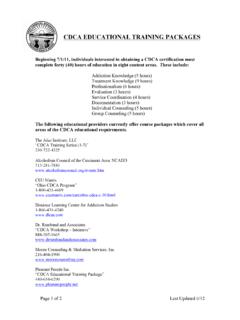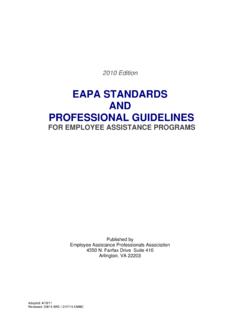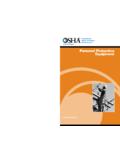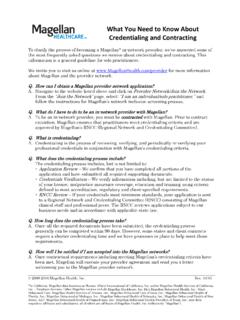Transcription of CONTINUING EDUCATION CONTENT AREA …
1 CONTINUING EDUCATION . CONTENT area DEFINITIONS. The Board approves CONTINUING EDUCATION which covers CONTENT areas required for certification, licensure or renewal of a Board credential. COUNSELOR EDUCATION CLASSIFICATIONS: The CONTENT areas in this series focus on EDUCATION appropriate for counselors (CDCA, LCDC II, LCDC III, LICDC, LICDC-CS): C1 - Theories of Addiction/Addiction Knowledge Models and theories used to describe addiction, contemporary and historical Effects of addiction on individuals including the biological, psychological (cognitive and affective), social and spiritual dimensions of life and functioning;. the interaction of the social and cultural contexts with addictive processes Differentiation of addiction from other medical and psychological conditions C2 - Counseling Procedures & Strategies with Addicted Populations Theories of counseling and psychotherapy employed in the treatment of psychoactive substance abuse and addiction Techniques utilized in the treatment of psychoactive substance abuse and dependence Models of treatment utilized in the treatment of psychoactive substance abuse and addiction, contemporary and historical Interaction of theories of personality with theories of counseling and psychotherapy.
2 Professional issues including counter-transference, boundary setting and characteristics and dynamics which decrease the effectiveness of therapists Relapse prevention Dual diagnosis C3 - Group Process & Techniques Working with Addicted Populations Models of group therapy Dynamics of therapy groups Components of group process and analysis; dynamics of facilitation Effects of addictive processes on group therapy Effects of individual diversity of group process C4 - Assessment & Diagnosis of Addiction Assessment procedures Diagnostic interviewing Use and interpretation of testing instruments for psychoactive substance abuse 1. and dependence criteria for determining diagnosis; criteria for determining appropriate modality and level of treatment Use of collateral data in the assessment process, including professional and nonprofessional material Dual diagnosis C5 - Relationship Counseling with Addicted Populations Models and techniques of assessing relationship dysfunction Use and interpretation of instruments used in the assessment of relations Theories of counseling and psychotherapy employed in the treatment of dysfunctional relationships Techniques and strategies utilized in the treatment of dysfunctional relationships Effects of addictive processes on relationship systems Effects of addictive processes on human growth and development Differential assessment of dysfunction resulting from codependency and other medical and psychological conditions Codependency C6 - Pharmacology Pharmacology of both drugs of abuse and those used in detoxification and the treatment of addiction and mental and emotional
3 Disorders including the action of pharmaceuticals and the physiological response, the interaction of pharmaceuticals, tolerance, the appropriate use of psychotropics with addicted persons and the effects of drugs on sensation and perception, learning and memory, human growth and development, sexual functioning and behavior C7 - Prevention Strategies Models of prevention of psychoactive substance use, abuse and dependence, contemporary and historical Methods and components utilized in the interpretation of a needs assessment Function of evaluation instruments; social and cultural influences on the use of psychoactive substances Risk factors associated with the use, abuse and dependence on psychoactive substances Prevention and intervention strategies used with various groups identified by age, gender, ethnicity, sexual orientation, ability; employee assistance programming, student assistance programming Wellness C8 - Treatment Planning Models of treatment planning; adapting treatment strategies to individual needs and characteristics including persons with other medical and psychological conditions criteria for admission, CONTINUING care and discharge appropriate to diverse levels 2.
4 Of treatment Methods of documenting the course of treatment Relapse prevention C9 Legal & Ethical Issues in Counseling Principles supporting and informing the ethical codes pertaining to addictions counselors Specific knowledge of appropriate ethical codes and laws associated with addictions counseling Obligations and procedures which encourage the ethical conduct of counselors GAMBLING EDUCATION CLASSIFICATIONS: The CONTENT areas in this series focus on EDUCATION appropriate for individuals who hold the gambling disorder endorsement: G1 - Basic Knowledge of Gambling Disorder Understanding the history, prevalence and social impact of gambling in the US. Understanding the history and theoretical basis for treatment of gambling disorder as well as familiarity with current research and literature in the field Knowledge of gambling disorder terminology, progression of the disorder, and withdrawal symptoms Knowledge of client evaluations for gambling disorder including screening, intake, assessment and diagnostic criteria G2 - Gambling Counseling Practice Understanding the effect of gambling disorder on the gambler personally, interpersonally, financially, as well as management of the disorder and the recovery process Knowledge of skills in gambling disorder treatment including individual, group and family counseling.
5 Interventions and treatment planning Understanding the relationship of gambling disorder to substance abuse Understanding of sociocultural values and attitude systems related to finances, gambling disorder and spiritual concerns Knowledge of client care in gambling disorder treatment including case management, referral resources, report and record keeping, and consultation. Knowledge of the steps, traditions and philosophy of Gamblers Anonymous, its relation to various treatments and the programs of Gam-Anon and Gam-A-Teen G3 - Special Issues in Gambling Treatment Understanding special populations as it relates to gambling disorder including adolescents, older adults, female gamblers, cultural minorities and criminal justice Knowledge of relapse and relapse prevention as it relates to gambling disorder 3. Understanding suicide, co-occurring disorders and chronic illness as it relates to gambling disorder G4 - Professionalism in Gambling Treatment Understanding administrative and clinical supervision as it relates to gambling disorder treatment Knowledge of client rights in gambling disorder treatment including confidentiality, informed consent, and non-discrimination Knowledge of counselor responsibilities in gambling disorder treatment including reporting duties, client welfare, inter-professional relationships and continuous quality improvement PREVENTION EDUCTION CLASSIFICATIONS: The CONTENT areas in this series focus on EDUCATION appropriate for prevention professionals (RA, OCPSA, OCPS I, OCPS II).
6 P1 - Planning & Evaluation Information gathering and data analysis techniques Stages of community readiness Assessment of community conditions Strategies to build community capacity Strategic planning processes Logic models as a planning and evaluation tool Theory of Change concepts Problem prioritization strategies Components of effective prevention program planning Effective, outcome-focused prevention programming development Prevention program evaluation instruments/models/strategies Validity, reliability and cultural relevancy of evaluation instruments/models Evaluation activities to document program fidelity Sustainability strategies Basic budget requirements set by funders P2 - Prevention EDUCATION & Service Delivery Training and group facilitation techniques Prevention strategies, best practices and models Learning styles, instructional strategies and presentation methods Information gathering techniques and data sources Training evaluation models, instruments and processes Current behavioral health trends and research Prevention resources for instructional programming Cultural diversity and competency Prevention intervention protocols 4.
7 Healthy living strategies P3 - Communication Policies, procedures, regulations, and ethical codes that guide interactions with the media and public Effective communication methods, models and theories Advocacy and promotion techniques and resources Copyright laws and reference procedures Effective media and marketing trends, strategies and evaluations Interviewing techniques Federal and local confidentiality laws Target populations and audiences identification Conflict resolution strategies P4 - Community Organization Strategies for mentoring and organizing community members Understanding community characteristics Strategies for capacity-building, engagement and collaboration Strategies for identifying community readiness and moving leaders to higher levels of readiness Advocacy strategies and promotion techniques Intercommunity organizational structures and patterns of communication Elements of formal agreements Negotiating skills and strategies Networking and outreach strategies Organizational dynamics and characteristics P5 - Public Policy & Environmental Change Political processes Evidence-based prevention policies Environmental change strategies Theory of Change concepts Socio-ecological systems theories Public health model Current behavioral health trends and research Advocacy and lobbying (and their differences).
8 Health disparities that impact diverse communities P6 - Professional Growth & Responsibility Prevention science on substance use disorders, behavioral health disorders, and physical health & safety Historical progression of prevention research, theory, models and strategies Application of current prevention theory and research to inform best practice Current prevention program models 5. Prevention evidence-based practices & principles Risk and Protective factors, including developmental stages and adverse childhood experiences Linking data to research and prevention strategies Prevention as part of an overall continuum of care Health promotion and wellness interventions P7 - Ethics for Prevention Professional code(s) of conduct/ethics related to the prevention profession Recipient rights and informed consent Conflicts of interest PREVENTION ADMINISTRATIVE/SUPERVISORY EDUCATION .
9 CLASSIFICATIONS: The CONTENT areas in this series focus on EDUCATION appropriate for prevention professionals in an administrative/supervisory role: PS1 - Human Resource Management Interpersonal Relations Organizational Development Employee Development Leadership Development Conflict Management Recruitment Emotional Intelligence Performance Management Organizational Change Coaching / Mentoring Quality Improvement Professional Writing Public Relations Supervision Labor Relations Training and Development PS2 - Fiscal Management Statistics Finance Accounting Grant Writing Budgeting Financial Procedures Risk Management 6. CLINICAL SUPERVISION CLASSIFICATIONS: The CONTENT areas in this series focus on EDUCATION appropriate for clinical supervisors: S1 - Counselor Development Includes clinical supervision models; teaching and training methods and strategies; assessment theories, practices and tools; feedback purpose and process.
10 Motivational techniques to promote career development; communication processes or techniques; problem solving and conflict resolution models; theories of stress management; appropriate professional boundaries regarding clients or fellow staff; adult learning models; special populations; ethics and ethical problem solving; agency policy regarding appropriate counselor-client and supervisor-supervisee relationships. S2 - Professional & Ethical Standards Includes public relation techniques; professional organizations, their goals and objectives; government agencies; agency, state and professional codes; route of reporting ethical violations; credentialing requirements; impact of nutrition and exercise on physical and mental well-being; stages of human development;. various cultures, values and lifestyles; confidentiality laws; grievance process.







